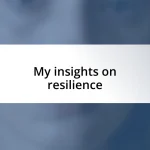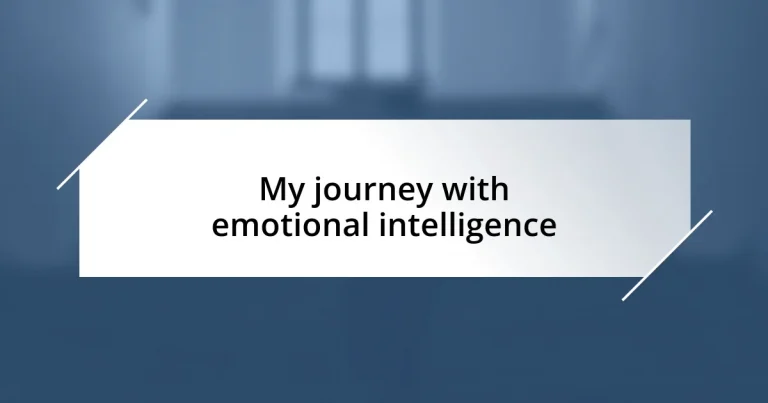Key takeaways:
- Emotional intelligence (EI) involves self-awareness, self-regulation, empathy, and social skills, enhancing communication and reducing conflict.
- Self-awareness is crucial for personal growth, enabling better emotional regulation and more constructive interactions with others.
- Empathy can be developed through active listening, open-ended questions, and putting oneself in another’s perspective, strengthening relationships.
- Continuous growth in EI is vital, involving feedback and embracing vulnerability to foster deeper connections and understanding.
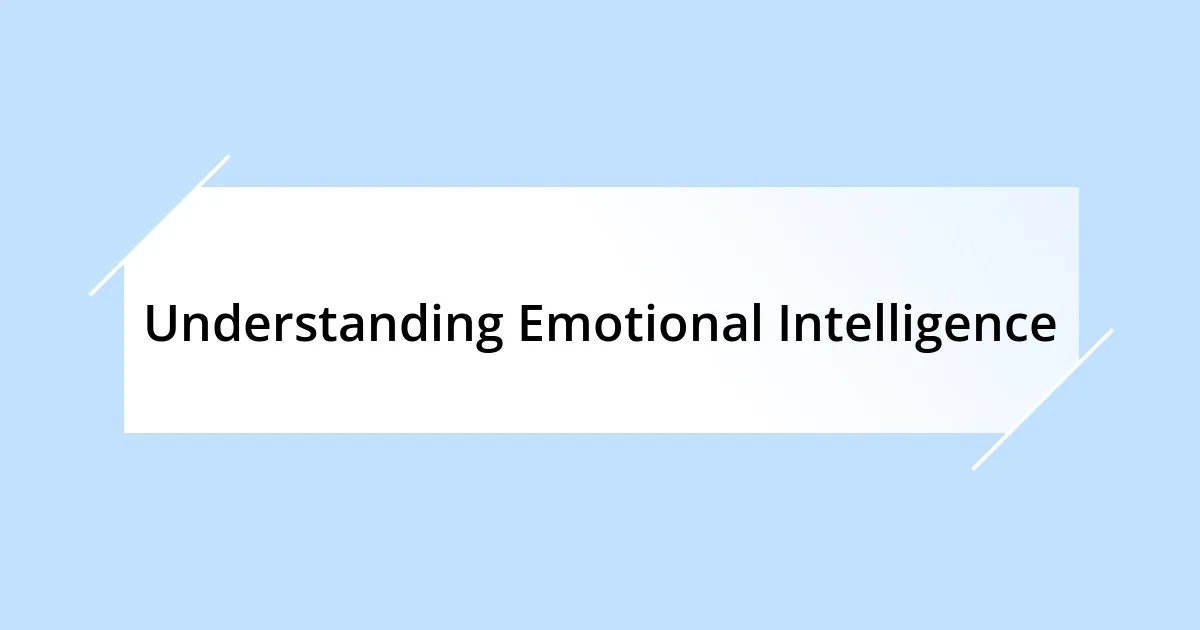
Understanding Emotional Intelligence
Emotional intelligence, often abbreviated as EI or EQ, refers to our ability to recognize, understand, and manage our own emotions while also being aware of the emotions in others. I remember a time when I misread a colleague’s frustration for anger, which led to unnecessary conflict. Isn’t it interesting how a simple misunderstanding can escalate a situation?
Delving deeper, I’ve discovered that emotional intelligence encompasses several key components, including self-awareness, self-regulation, empathy, and social skills. Reflecting on my own experiences, I’ve seen the difference that empathy makes in communication. When I take a moment to understand where someone is coming from, it often transforms the exchange into something constructive rather than confrontational. Have you noticed how a little kindness can turn around even the toughest conversations?
Finally, developing emotional intelligence is an ongoing journey. I often find myself asking how well I’m managing my emotions, especially in high-stress situations. For instance, when faced with a challenging project, I consciously remind myself to breathe and reassess my emotional state. This practice not only enhances my decision-making process but also fosters a calmer environment for those around me. Isn’t it empowering to realize that we can influence our emotional landscape?
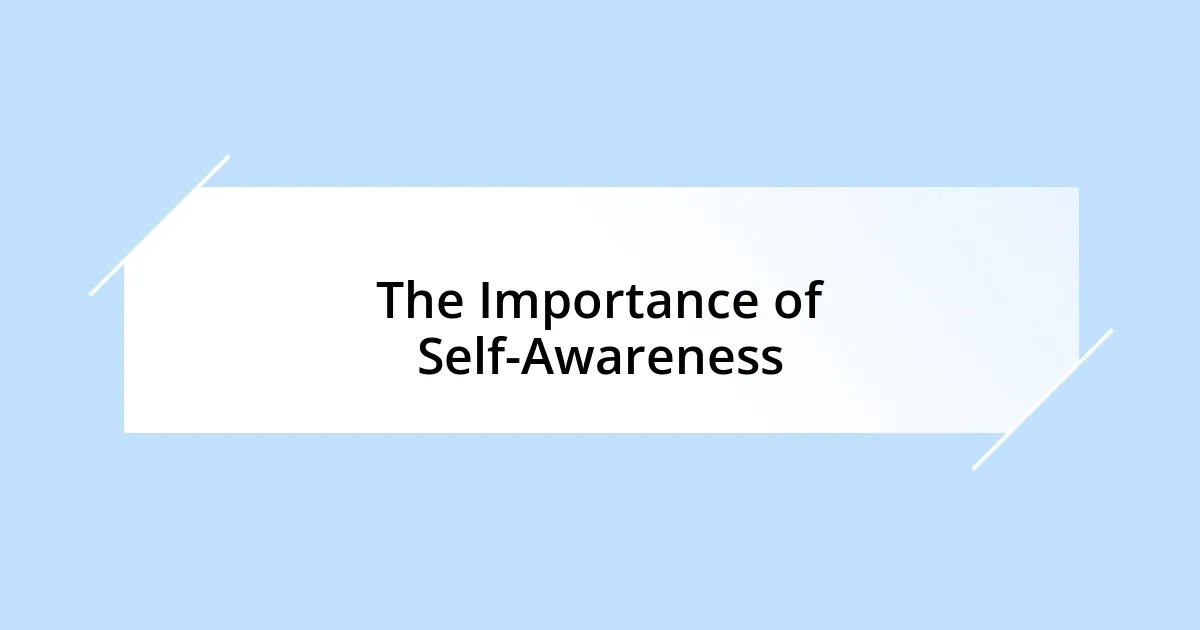
The Importance of Self-Awareness
Understanding the importance of self-awareness has been a game changer for me. When I first started my journey in emotional intelligence, I often acted on impulse, unaware of how my reactions affected others. I recall a moment when I was caught off guard by a friend’s critique; instead of tuning into my feelings of defensiveness, I shot back with a sarcastic remark. That experience opened my eyes to how vital it is to pause and reflect on my emotions before responding.
As I became more self-aware, I noticed how my emotional state dictates not just my behavior but also the atmosphere around me. For example, during a team meeting, I once entered feeling overwhelmed. Instead of projecting that stress onto my team, I took a moment to acknowledge my feelings. By sharing my concerns, I encouraged openness, prompting my colleagues to voice their own struggles. The entire dynamic shifted, and it felt like we were collaborating rather than competing.
Self-awareness allows for continual growth and learning. I often keep a journal to track my emotional shifts throughout the day, which helps me identify patterns and triggers. Through this practice, I’ve cultivated a better understanding of what situations spark certain emotions. The insights gained have led to more intentional interactions. In what ways have you been able to tune into your feelings and notice changes in your environment?
| Self-Awareness | Impacts of Lack of Self-Awareness |
|---|---|
| Encourages introspection and personal growth | Can lead to repeated misunderstandings in relationships |
| Facilitates better communication and conflict resolution | Increases anxiety and stress through misaligned reactions |
| Enhances emotional regulation | Results in unproductive or negative behaviors |
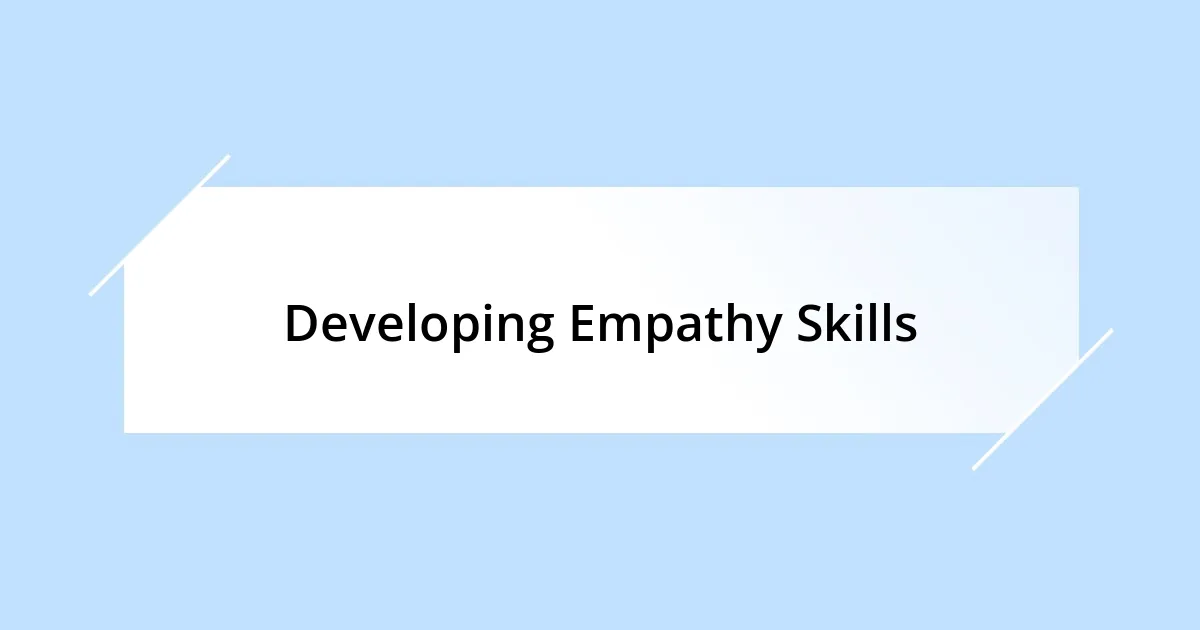
Developing Empathy Skills
I’ve found that developing empathy skills requires a genuine effort to connect with the emotions of others. There was a time when I noticed a friend pulling away after a difficult breakup. Initially, I thought it was best to give them space. But deep down, I felt compelled to reach out. When I did, simply listening to their feelings without judgment not only strengthened our bond but also revealed how much they needed someone to understand their pain. It’s fascinating how a little vulnerability can create a bridge to empathy.
Here are some practical ways to enhance empathy in our daily lives:
- Active Listening: Focus completely on the speaker, making eye contact and avoiding distractions. This shows that you genuinely care about their feelings.
- Ask Open-Ended Questions: Encourage deeper conversations by asking “How did that make you feel?” instead of yes-or-no questions.
- Put Yourself in Their Shoes: Try to visualize situations from another person’s perspective. It can significantly alter how you respond.
- Practice Nonverbal Cues: Sometimes, a comforting nod or a reassuring smile can communicate empathy even without words.
I believe that empathy isn’t merely a skill; it’s an art. Each encounter is an opportunity to practice and refine this vital human connection.
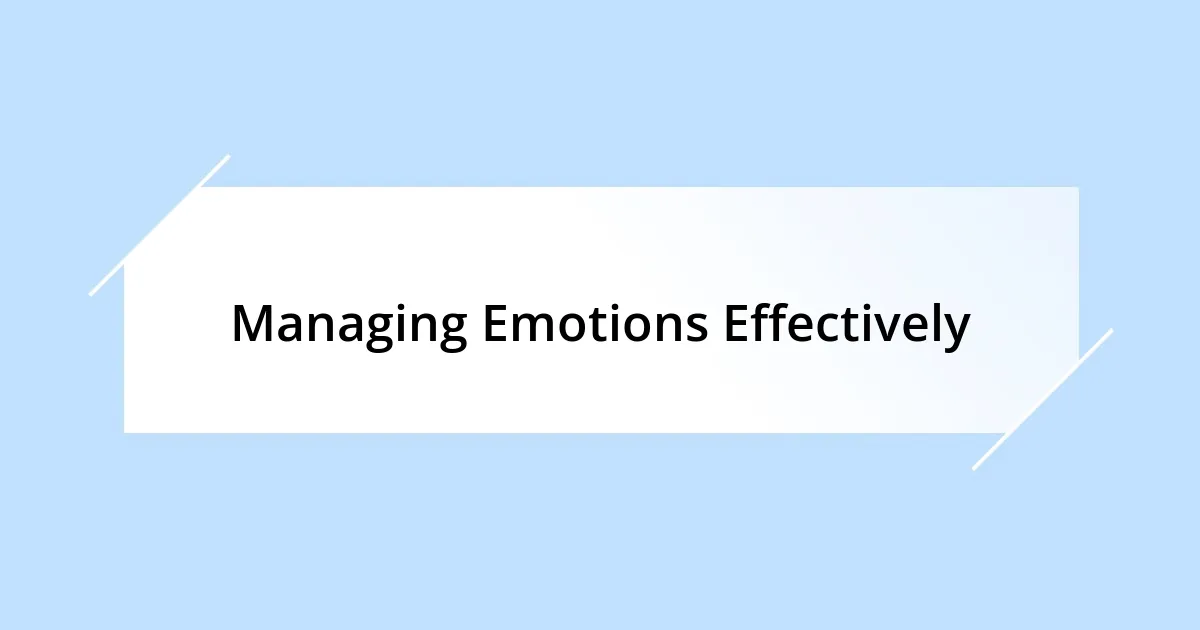
Managing Emotions Effectively
Managing emotions effectively is more than just a response; it’s about creating a harmonious relationship with ourselves and others. I remember a time when I felt overwhelmed during a particularly busy week at work. Instead of allowing frustration to bubble over in my interactions, I took a step back, breathed deeply, and identified what was causing my stress. By addressing it proactively, I was able to maintain a positive atmosphere during team discussions, proving to myself how crucial emotional regulation is in fostering collaboration.
There’s an art to managing emotions, one that requires constant practice. When I find myself in heated moments, I now ask myself, “What is the root of my reaction?” This pause not only ensures that I respond thoughtfully but often leads to insight about my triggers, like when I feel undervalued or anxious. For instance, after a colleague interrupted me during a presentation, rather than responding defensively, I focused on expressing my thoughts clearly. This not only diffused my rising frustration but also invited a more balanced dialogue.
As I continue this journey, I’ve found that journaling has become an invaluable tool for managing my emotions. Reflecting on my feelings helps me identify patterns, much like connecting the dots on a canvas. When I look back at my entries, I often realize how certain situations elicit similar emotional responses, which gives me the power to adjust my actions next time. Have you ever wondered how a small shift in perspective can change the outcome of a challenging situation? It’s magnificent to see how managing emotions effectively can turn potential conflicts into opportunities for growth and understanding.
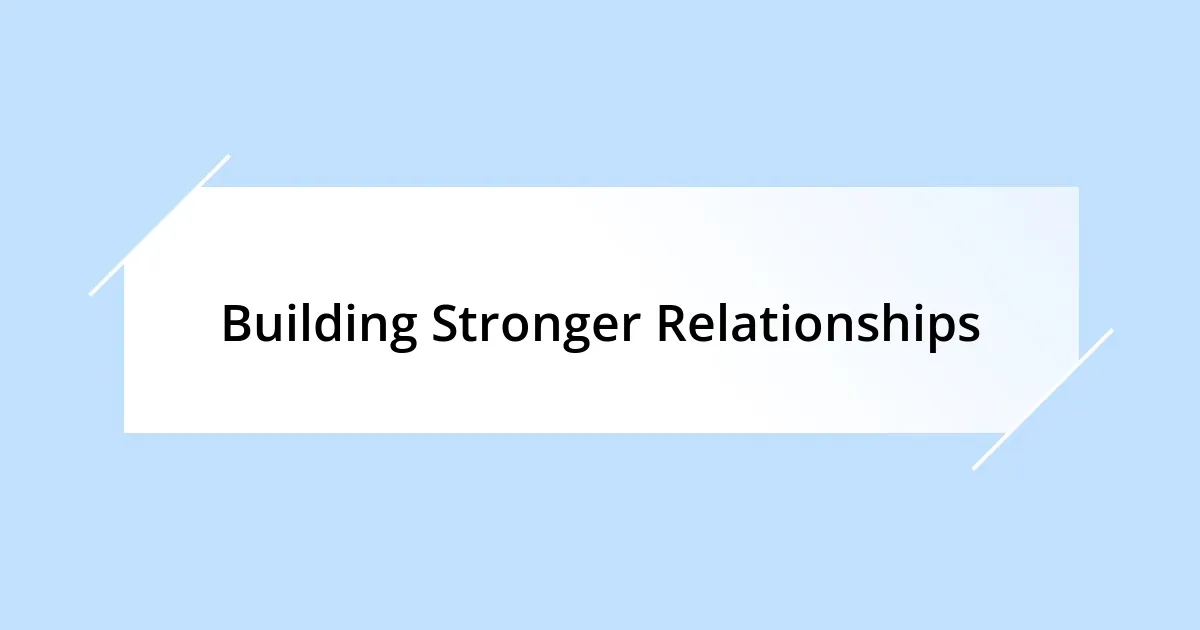
Building Stronger Relationships
Building relationships with emotional intelligence is incredibly rewarding. I recall a time when a coworker seemed distant during group projects. Instead of brushing it off, I decided to reach out, which revealed they were feeling overwhelmed by personal issues. I realized that being there for them not only deepened our professional rapport but also created a safe space for vulnerability—a true game-changer in how we collaborated.
I’ve noticed that emotional awareness plays a vital role in nurturing connections. When I pay attention to the emotional climate of a conversation, I can often sense unspoken worries or joys. This skill allowed me to engage more authentically with friends during a dinner party; instead of keeping things light, I shared a meaningful story about my fears and dreams. The atmosphere transformed, as others began to open up, leading to deeper, more enriching discussions. It struck me just how powerful shared experiences can be.
Creating stronger relationships often hinges on our ability to express appreciation. There was a moment when I sent a heartfelt note to a long-time friend, thanking them for always being supportive. The response was overwhelmingly positive, and it sparked a weekly check-in tradition that has brought us even closer. Have you experienced the warmth of gratitude in your relationships? Taking a moment to recognize and affirm those we care about can truly enhance the bonds we share, making them more resilient against the challenges life throws our way.
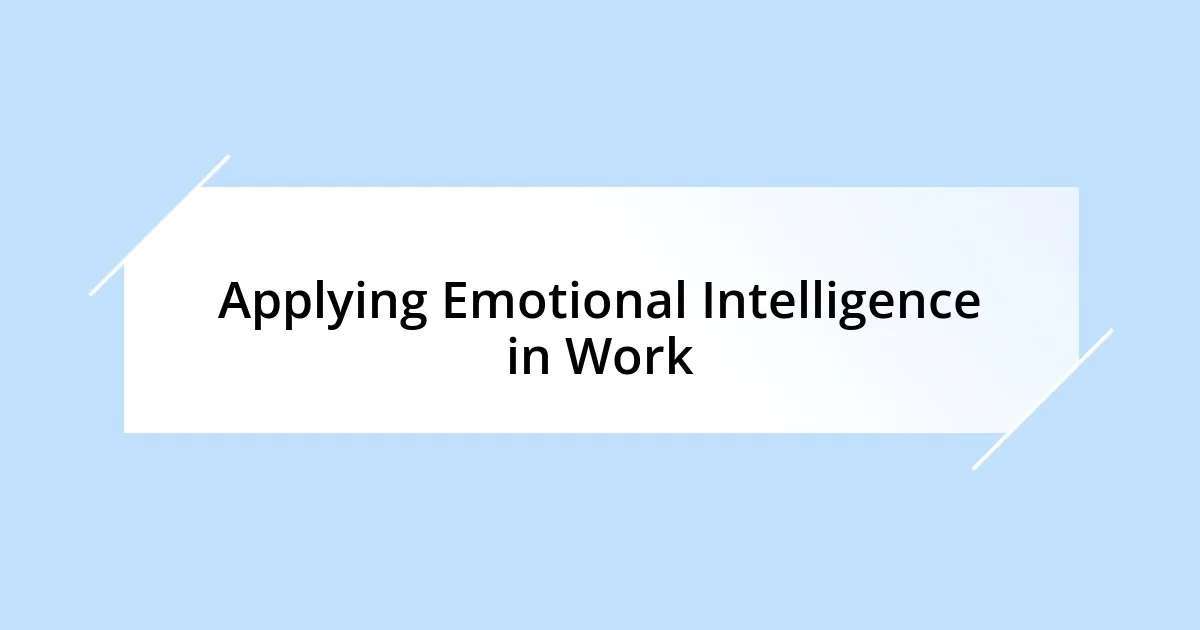
Applying Emotional Intelligence in Work
Applying emotional intelligence at work can transform not only individual performance but team dynamics as well. I remember a scenario when our team faced a tight deadline, and tension was palpable. Instead of charging ahead in silence, I initiated a brief check-in meeting where everyone could express their concerns. It was incredible to see how sharing our feelings lightened the atmosphere, allowing us to collaborate more effectively and meet our deadline with a renewed sense of purpose.
In my experience, empathy is a game-changer in the workplace. One day, a colleague was struggling with feedback on their project, visibly deflated after our session. Rather than diving into options or solutions right away, I took a moment to acknowledge their feelings. By simply stating, “I can see this is tough for you,” I created a space for them to express their frustrations. This small gesture not only comforted them but also fostered trust, encouraging a more open dialogue about improvements moving forward. Have you ever noticed how a simple act of kindness can shift the whole vibe in a workspace?
Moreover, I’ve discovered that self-awareness is crucial when applying emotional intelligence. During a particularly challenging presentation, I could feel my nerves creeping in. Instead of dismissing the anxiety, I acknowledged it—saying to myself, “It’s okay to feel this way.” By embracing my emotions rather than fighting them, I delivered my presentation with authenticity and confidence. It was a valuable reminder that recognizing our feelings not only enhances our performance but also resonates with our audience, creating a genuine connection. Have you ever experienced the power of embracing your vulnerability in front of others? It’s truly enlightening.
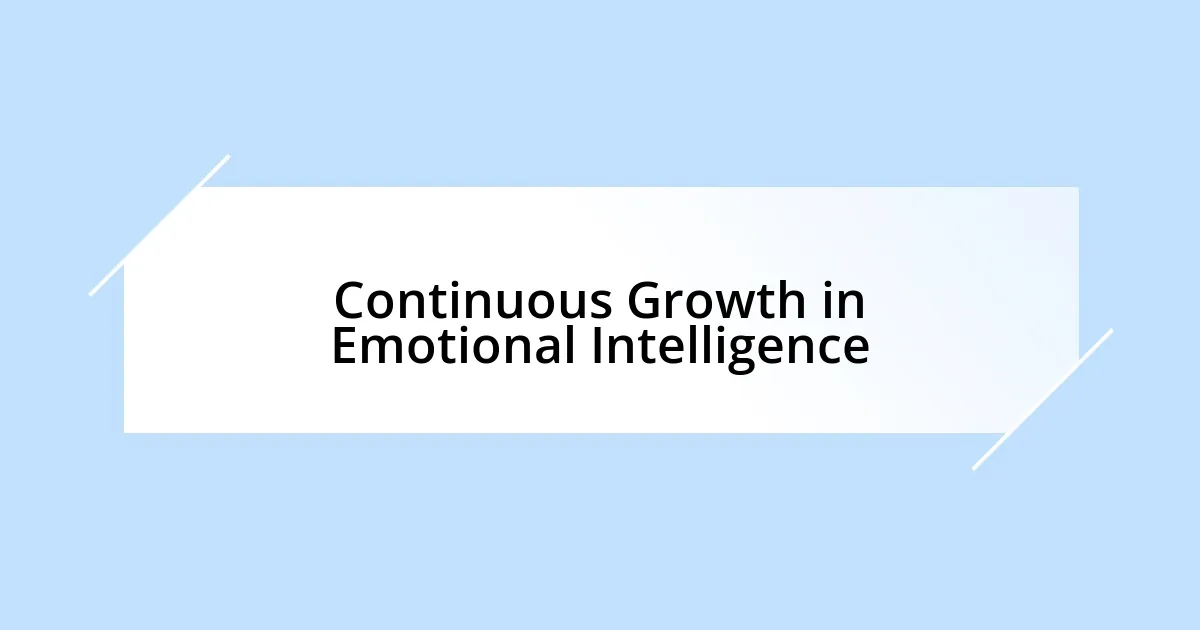
Continuous Growth in Emotional Intelligence
Continuous growth in emotional intelligence is a journey I actively pursue. Recently, I took a course focused on advanced empathy techniques. It was fascinating to learn how tuning into others’ emotional signals can significantly improve interactions. Can you imagine the impact of genuinely understanding someone’s feelings rather than just hearing their words? This experience reinforced my belief that emotional intelligence is not a destination but an ever-evolving process.
As I reflect on my emotional growth, I recognize the importance of feedback. A mentor once encouraged me to seek out constructive criticism regarding my emotional responses. Initially, it felt daunting, but I decided to embrace it. This practice allowed me to pinpoint areas where I could be more attuned to both my emotions and those of others. Have you ever sought feedback that prompted a breakthrough in your emotional understanding? It’s a powerful tool, enabling growth and fostering deeper connections.
Embracing vulnerability has been another significant aspect of my growth. During a recent team meeting, I shared some struggles I was facing in balancing personal and professional life. The response was uplifting. Colleagues began to share their own challenges, which created a sense of solidarity. It was a reminder that vulnerability doesn’t show weakness—instead, it opens the door for deeper empathy and connection. How often do we hold back out of fear? This experience taught me that being open can lead to a shared journey of growth in emotional intelligence.











